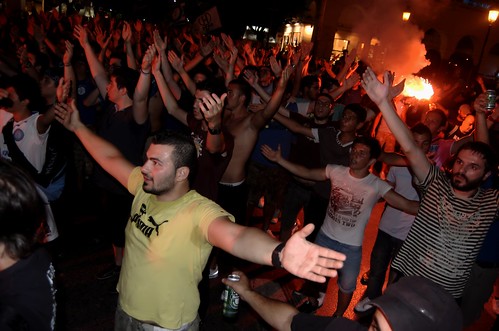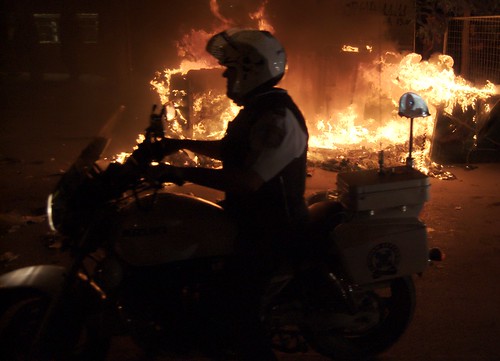
Iraklis FC supporters in protest march, Thessaloniki, Greece, originally uploaded by Teacher Dude's BBQ.
Although Greece's economic crisis and the possible relegation of a football team may have, at first glance very little in common, the story behind the possible expulsion of the country's oldest club from the Superleague encapsulates many of the pathologies that have led to the country's present dire financial sitiuation.
Abuse of power, lack of transparency, hints of corruption and an absolute distrust of those in authority are some of the common themes that link both stories. Fans of Iraklis FC are convinced that the decision to not allow their team to take part in the Superleague is the result of shadowy, forces who are playing fast and loose with the rules that decides such matters to force the team out. Fans add that the same charges that have been levelled at Iraklis over financial oversights and debts are also valid for many other teams.

Whether the fans claims have any vailidity or not is less important than the insight into how ordinary Greeks view the authorities, be they connected with sport or politics in general. The fact that accusations of abuse of power and corruption are so readily accepted comes from the seemingly endless stream of scandals that make up Greek public life and which the present political system not just tolerates but actively encourages.
While PM Giorgos Papandreou may claim that his party is going to clean up this particular Augean stable the reality is that few believe that he is willing or able to change the intricate web of patron-client relations that make up the foundation of modern Greek party politics. Indeed many members of Papandreou's own party have much to fear any such clean sweep as PASOK has a long and rich history of financial irregularities from its time in power, one of the reason why it lost two general elections in 2000 and 2004.
One only has to look at Parliaments handling of the Siemens bribery scandal which has been rumbling on for years. The revelations that the German corporation had a 100 million euro slush fund which it used to win contracts and favours from both PASOK and New Democracy whilst they were in power have simply confirmed Greek voters' worst suspicions about the country's political caste.

The case only came to light after German public prosecuters brought charges against the company for bribery. Even after the facts of the case became known the Greek parliament dragged its feet and made sure that the investigation never uncovered the culprits. A farce which is currently being repeated and in all probability will not not lead to any prosecution despite mountains of evidence.
Given this and the dozens of other scandals that have come to light over the last few years Iraklis supporters and Greek voters in general can hardly be blamed for seeing those in authority as little more than thieves and liars. Similarly, the fact that their sense of outrage and frustration over the way things work finds expression in a seemingly endless series of marches and demonstrations which often boil over into angry outbursts starts to make sense in a system were checks and balances on power are little more than a constitutional abstraction.
No comments:
Post a Comment